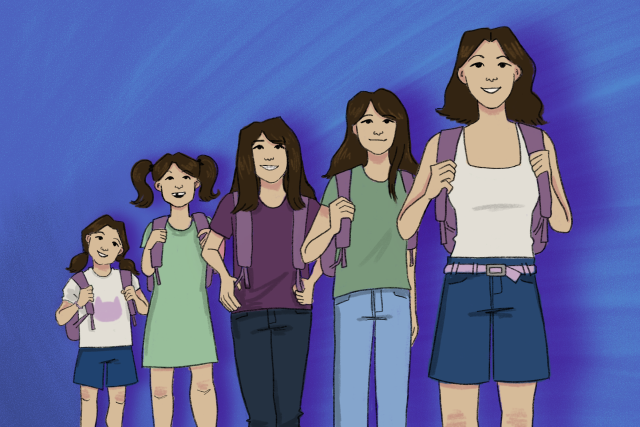[ad_1]
For the better part of our early lives, our identities are intertwined with our learning institutions, defining what we spend our time on, who we meet and how we grow. The average American spends 13.3 years of their life in formal education, and students actively pursuing higher education are likely to be above that average.
Yet, when I look back on the time I spent in school before coming to college, I see only a haze of past experiences — a fuzzy picture of who I was and who I have become throughout my educational lifespan. By reflecting on our educational memories, we can discover untold truths about who we are as students, giving us the clarity needed to conquer our college struggles.
If you think of formal education like the three-act structure of a story, kindergarten and primary school are the setup, intermediate and secondary school are the confrontation and higher education is the resolution. Conceptualizing school in this light abstracts our day-to-day education, allowing us to focus on the big picture. As active participants in the page-turns of life, it can be hard to fully recognize the recurring themes that shape us from chapter to chapter. But by revisiting the earlier chapters, we might find the answers to the questions that trouble us now.
Regardless of grade level or age, there is always some continuity in what school offers. You’re placed in an established academic environment that provides a constant influx of new information — inside and outside the classroom — that you learn, absorb and are assessed on. This learning happens alongside your peers, and that collective experience fosters the formation of relationships. All of these experiences give you the ability to handle new stressors or conflicts — and you mature, personally and emotionally, because of it.
These have been continuities in our education since we were pink-faced preschoolers, and they are central to what makes school so important to human development. However, differences from institution to institution often reveal more about how transformative the school experience can be.
The path from primary school to postgraduate education sees us passing through institutions that vary greatly in terms of the formality of instruction, the amount of support provided and the social networks in place. In primary school, we learn how to learn and are encouraged to explore new interests with the constant nurturing of teachers and parents. In middle and high school, education becomes more regimented, and we tackle more complex material and tougher examinations while still receiving support. College is then the most independent part of the learning process, where we meet a larger array of new people and must navigate our way through the end of our formal education and the emergence of adulthood.
What truly matters isn’t the broad generalizations about each phase of education, but the nuance of each student’s individual experience within them. We weren’t drones drifting along from grade to grade, marching through the same academic, emotional and social struggles in lockstep with our peers. Each of us encountered our own unique challenges, conflicts, passions and peers, creating the students and people we are today.
If education is first and foremost about learning, then reflecting on your education is the key to relearning good habits and unlearning bad ones. If, for example, you still can’t seem to wrap your head around test-taking and studying, it would be worthwhile to reflect on when you first started to hone that skill in middle school and high school and think critically about what has and hasn’t changed in your approach.
One of the biggest challenges in transitioning to college is learning how to study with a more fragmented schedule and far less teacher direction. College isn’t like high school or middle school where you sit in class for 30 hours per week with teachers guiding you through each lesson. However, we can look back on these experiences and recognize what made that learning environment effective and apply that to our current learning difficulties.
We can’t depend on the rigid structure of high school or the nurturing nature of primary school to protect us from the painful realities of college life and adulthood at large, but we can draw on our past to inform our present. While college students must seek out support in college rather than receive it automatically from their K-12 educators, they have each other — and by applying lessons from earlier schooling, they can create a network of support and mutual understanding.
This is not to say that students should dwell on the past. Getting bogged down by past failures and experiences can be damaging to the positive progress you’ve made in your life so far and especially in your academic journey. You should acknowledge the highs and lows of your education and take them as they are: learning experiences.
You aren’t supposed to be the perfect student at 20 years old — and you definitely weren’t supposed to be at 10. But take some time, at least a minute, to reflect on everything that has occurred throughout your learning journey. Trace the trajectory of your educational experience with all its ups and downs and how it brought you to Ann Arbor today. Appreciate that kid you were back in kindergarten, moldable like a freshly opened tub of Play-Doh, eager to learn and ask questions and be passionate about your interests. I might be more than a decade older now, with a stubbled face and a grocery list of experiences I both cherish and regret, but I am still a student first. Just like him.
Max Feldman is an Opinion Columnist who writes about campus culture and the overlooked issues facing students in his column “Overlooking Michigan.” He can be reached at maxfeld@umich.edu.
Related articles
[ad_2]
Source link











